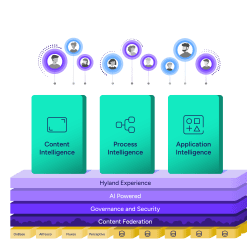Macquarie University
Public research university in Australia dramatically improves decision-making time after going paperless with Hyland's Alfresco platform.

Harness the power of a unified content, process and application intelligence platform to unlock the value of enterprise content.
Learn more
Explore Hyland’s solutions by industry, department or the service you need.
Overview of solutionsIt's your unique digital evolution … but you don't have to face it alone. We understand the landscape of your industry and the unique needs of the people you serve.
 Overview of industries
Overview of industries
Countless teams and departments have transformed the way they work in accounting, HR, legal and more with Hyland solutions.
 Overview of departments
Overview of departments
We are committed to helping you maximize your technology investment so you can best serve your customers.
 Overview of services
Overview of services

Discover why Hyland is trusted by thousands of organizations worldwide.
Hear from our customers
Our exclusive partner programs combine our strengths with yours to create better experiences through content services.
Overview of partners
Find resources to power your organization's digital transformation.
Browse the resource center
Hyland connects your content and systems so you can forge stronger connections with the people who matter most.
Learn about HylandWith our modern, open and cloud-native platforms, you can build strong connections and keep evolving.
 Dig deeper
Dig deeper
Reading time minutes
Public research university in Australia dramatically improves decision-making time after going paperless with Hyland's Alfresco platform.
Macquarie University in Sydney, Australia, focuses on transformative learning and world-class research. The prestigious university has almost 50,000 students and 2,800 staff in its four schools and has been widely recognized for high performance in teaching, research, graduate employability and facilities.
Before implementing Hyland's Alfresco platform, Macquarie University struggled with high volumes of physical records and paper-based information. Statutory reporting to the government and managing records to comply with the requirements of the university caused student files, staff records and property records about building maintenance to pile up.
These paper documents were managed manually and stored in archives that flooded several years ago, resulting in major damage.
“It caused a lot of mold, and we had to do a lot of work to de-mold every piece of paper,” said Chi Nguyen, Macquarie’s digital information manager. “That’s when we began the journey to digitization.”
Macquarie needed a way to better manage its digital assets around records and documents and facilitate better electronic workflows to enhance the efficiency of many of the processes around the university.
— Chi Nguyen, Digital Information Manager, Macquarie University
After evaluating several solutions, Macquarie chose Hyland's Alfresco platform largely because of its vibrant user community and open architecture.
“One of the most important things that drove us to Alfresco platform was that it allowed us to access the code, which enabled us to customize the solution to our requirements,” Nguyen said. “We were able to achieve a great deal of integration, not only from other systems to Alfresco platform but to other systems as well.”
Macquarie deployed Alfresco and began moving its digitized content to the platform. Very quickly, Alfresco use cases grew and the university began not only managing records for its central records area, but also managing records for other autonomous units such as human resources records, property records and its Graduate School of Management.
In addition to records, the school also used Alfresco for document management, providing committee members with quick access to agendas and meeting minutes.
“Before Alfresco platform, we had a shared drive where users made updates, but after a while, you didn’t know which version was the authoritative version,” Nguyen said. Now, he said, "we were able to consolidate into a central area and people now know for sure what is the single source of truth for any piece of information.”
Today, Macquarie no longer produces physical paper records. All student records are now electronic files, and the Alfresco platform serves as the school’s central content repository. The moment student records are scanned, for example, administrators can move the file directly into a specified folder to be automatically routed to the right student record folder. A similar electronic workflow has been created for invoices.
“There is very little work they need to do other than scan the physical document,” Nguyen said. “This was very important for us to move the university away from a paper-based workflow into one that is purely electronic.”
Macquarie’s Alfresco platform now contains over 1.6 million assets and has over 2,500 users. Each week, approximately 10,000 to 15,000 new assets are created and uploaded into Alfresco.
The first step was digitizing the content. Now, the university is focused on gaining insight into its content. For example, analyzing student records to better understand what factors drive student retention, as well as what information is relevant for statutory reporting.
Though some aspects of the platform are currently available on tablets, moving forward, the school plans to leverage Alfresco’s mobile application to make it easier for users to access Alfresco remotely.
“With the new adoptions of electronic workflows, and as we roll out new workflows to different business groups around the university, the ability to make approvals and assessments while on the road will be much better inside a mobile app specifically designed for the tablet or phone,” Nguyen said.
Macquarie also plans to leverage Alfresco’s cloud-based infrastructure in the near future. As a Premier Services customer, Macquarie benefited from the use of working with an Alfresco Technical Account Manager, and their internal administrators attended several training sessions to be able to quickly leverage the platform across the university’s many business units.
“I would highly recommend Alfresco platform consultancy services to any new customers based on the experience we’ve had,” Nguyen said. “Alfresco platform has been a very important system within the university. It’s hard to imagine that there’s any other product that can satisfy so many different use cases in a university environment, where you have many autonomous units, each with their own very specific requirements.”